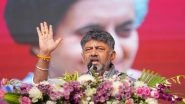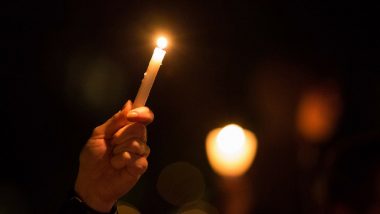Bhopal, April 4: POSOCO CMD KVS Baba on Saturday assured that there will not be any problem during the blackout tomorrow, saying all the states have drawn plans to tackle the situation. Baba held a video conference with electricity facilitators across India to deal with the nine-minute blackout at 9 pm tomorrow, when the power demand is expected to fluctuate, posing threat to electricity grids.
Prime Minister Narendra Modi has asked citizens to switch off lights for nine minutes at 9 pm on Sunday and light candles and torches to "challenge the darkness” of the coronavirus crisis that has forced a three-week country-wide lockdown. We discussed the ways how to reduce power production when the electricity demand dips and increase when the energy demands rises, Baba said. Switch Off All Lights, Light Candle, Diya, Torch or Mobile Phone Flash at Your Door or Balcony For 9 Minutes on Sunday, April 5 at 9 PM to Beat The Darkness Brought by Coronavirus: PM Narendra Modi to India.
Of course, the demand will dip during the blackout and will jump thereafter at 9.09 pm, one of persons who took part in the meeting told PTI. The Power System Operation Corporation (POSOCO) CMD held meeting with concerned officials of state load dispatch centres of India, Regional Load Dispatch Centres and National Load Dispatch Centre from 11.30 to 3.30 pm to know the preparedness for the blackout, he added.
It was agreed upon that the power production will be brought down at 9 pm on Sunday when the demand will dip and increase when it will rise, he added. And for this, all the states have firmed up their plans. There will not be any problem during the blackout, he said. On July 30, 2002, Madhya Pradesh, Maharastra, Gujarat, Goa and Chhattisgarh had plunged into darkness when Mumbai-based Western Region Grid had collapsed.
At that time, Madhya Pradesh had been blamed for overdrawing excess power from the grid, bringing down drastically its frequency. A grids frequency is treated ideal between 49.9 and 50.05 Hertz. The possibility of grid collapses rises when frequency nosedives due to excess withdrawal of power compared to its availability in the system.
In contrast, frequency shoots up when excess power is available compared to less demand in the system, due to which sometimes there is a risk of collapse of the grid, power expert RK Verma said. Former Madhya Pradesh Power Transmission Company Chairman and Managing Director RK Verma said there is nothing to panic about, as Prime Minister Narendra Modi has made the announcement two days ahead of the blackout.
Right now due to the lockdown, the power demand is significantly less. "The industrial demand I think was just 20 per cent, of its total capacity across the country given that the production houses are shut or working with skelton work forces," Verma added.
Secondly, he said, during the nine minutes of the blackout, all electricity appliance should not be switched off at one go. Refrigerators and air-conditioners will be operating at that time. So, the grids frequency will not go up drastically with less withdrawals.
Moreover, the grids were safe due to modern technologies now-a-days, he added. There are five grids in India all of them are inter-connected to wheel power from Kashmir to Kanyakumari, Verma said.
(The above story is verified and authored by Press Trust of India (PTI) staff. PTI, India’s premier news agency, employs more than 400 journalists and 500 stringers to cover almost every district and small town in India.. The views appearing in the above post do not reflect the opinions of LatestLY)













 Quickly
Quickly













